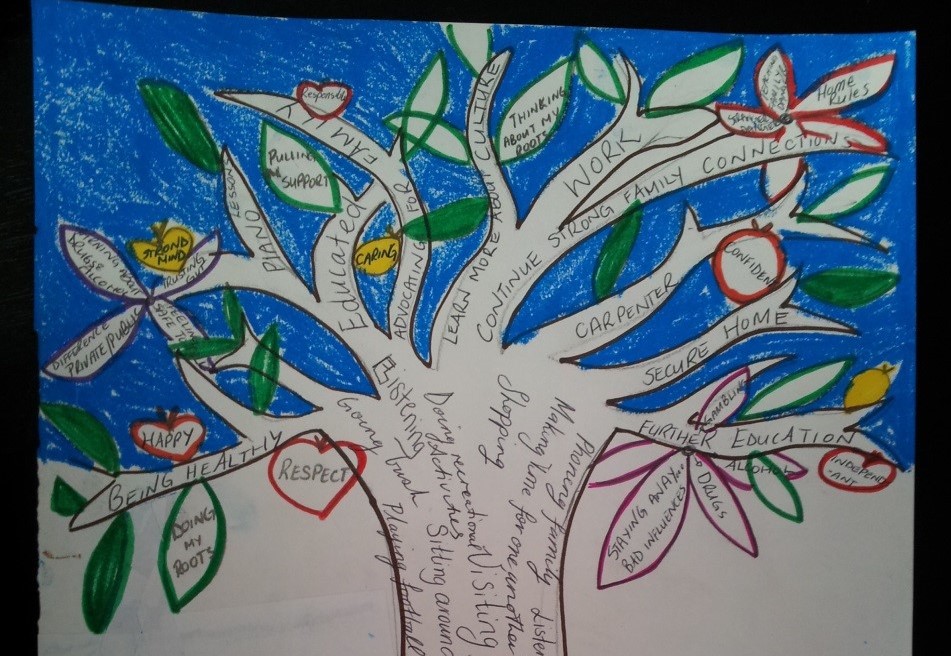
Before we do the branches we are going to think about the Fruit.
Inside the fruit is the seed and from the seeds come the next generation of trees. If we grow strong children this helps them to become strong people who will build strong families and grow the next generation of strong children. Then we will have strong people, strong families and strong communities.
In the fruit on our trees we are going to put the gifts and values that we want to develop and pass down to future generations.
Focus questions:
• What sort of people would you like in your family?
• Are there cultural values you want to be strong in your family?
• What are the ways of living you would be proud to see in the children?
• If you think about people in the community now or in the past who you know were strong and respected, what is it about them that you would like to make strong in your family? In the children?
• Sometimes it helps to think of what you don’t want? And then go back to how you would want them to be instead …
If people are having difficulty naming values or gifts to put on their Fruit, at first we wait for a while and ask questions to expand the few ideas that do come forth. You may find that when a word is explained it contains other values/concepts or attributes within it.
If people continue to struggle, then we have successfully used Innovative Resources’ Strengths Cards. We have them ready just in in case. If you decide that you might use them, select cards that seem appropriate before the session. We pre-select those with words or concepts that would be relevant in our context. When we use them, after acknowledging and listing the ideas already given, we spread the cards on the table and introduce them with, ‘we might get some more ideas from these cards’ and then we discuss each in turn. We ask, ‘Which ones are most important?’ Members of the group select cards that represent the values and attributes that are most important to them. These are listed alongside those previously mentioned. When the words are written up, people select the ones they want for their Personal Trees. Once everyone has recorded the values/attributes onto their personal Trees, we continue as in the previous sessions by interviewing one person in the group:
Yarning time about ‘Fruits’: Questions to expand the stories
• In what ways is ______ important to you?
• Would you like to tell us the story of how it came into your life?
• Was there, or is there, anyone else in your life who values this important quality?
• Do they now know you also think this is important?
• Would children in your family know this is important to you?
• How would they know this?
Because this session on ‘Fruits’ is critical to embed personal and cultural values, after more stories in small groups or pairs, we always return to the larger group for further discussion.
First we explore the positive side:
• How would you know a child was ‘showing respect’? (using one of the frequently chosen values).
• If they were ‘showing respect’ what would they be doing/saying?
• How do children learn these ways of being? How do they learn to ‘show respect’?
And then, when children still need to learn these particular values:
• When children are messing up, getting into trouble, which of the values and ways of being are they going against?
• What can people do about this? What works?
While we have used children as an example here, we also consider the whole family: how do family members ‘show respect’ for others?
Home Yarning about Fruit
Talk to your family about what they think is important and why. Get them telling stories!
• Talk to children about these gifts/Fruits, and what it would be like in a family without these special gifts.
• Talk about how you show these gifts/Fruits in your family? Are we good role models?